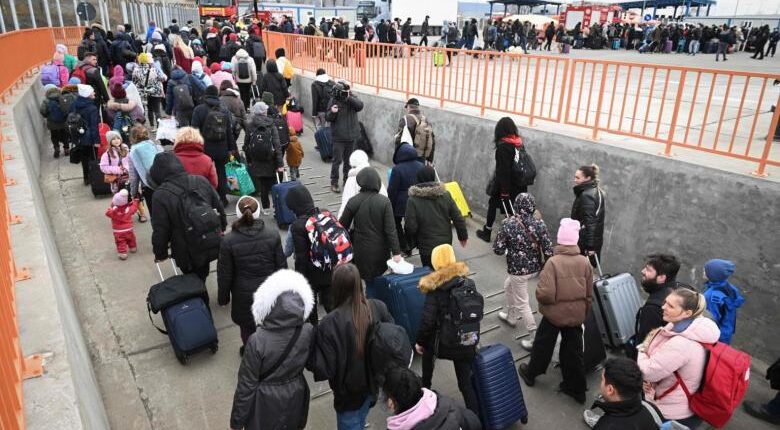NEW YORK (NYTIMES) – Nearly everybody who crossed the Danube on the open-air ferry from Ukraine and landed within the frostbitten Romanian port metropolis of Isaccea on a latest morning had a curler bag and a stopgap plan. One lady deliberate to affix her husband in Istanbul. Another was headed to Munich, the place her firm has its headquarters. Others have been assembly brothers, cousins, in-laws and associates in Madrid or Amsterdam, Paris or Sofia, Bulgaria.
And then, they hoped to return to Ukraine.
“I need to return,” mentioned Lisa Slavachevskaya, who travelled along with her 10-year-old son and five-year-old daughter from Odessa, Ukraine. “My husband, my mother and my grandmother are there.” She mentioned she deliberate to go house in a month.
Whether such fast turnabouts are attainable is without doubt one of the many uncertainties hanging over Europe’s fastest-growing refugee disaster since World War II. No matter how the disaster in Ukraine ends, the prices of serving to the hundreds of thousands of Ukrainians fleeing Russian bombs will probably be staggering. Some early estimates put the invoice for housing, transporting, feeding and processing the flood of humanity at US$30 billion (S$41 billion) within the first yr alone.
“This is a humanitarian and medical emergency in the next weeks,” mentioned Professor Giovanni Peri, director of the Global Migration Centre on the University of California, Davis.
What occurs over the subsequent few months will decide if Europe will face the extra prices of an enormous resettlement that has the potential to reshape the financial panorama.
European economies are nonetheless recovering from the coronavirus pandemic and dealing with cussed provide chain shortages and excessive inflation. As expensive as it is going to be to offer short-term aid to households briefly displaced by the warfare, over the long run the expense of integrating hundreds of thousands of individuals could be a lot better and put immense pressure on housing, schooling and healthcare methods.
While a large inflow of staff, significantly expert ones, is more likely to enhance a nation’s output over time, it may intensify competitors within the job market. About 13 million folks have been unemployed within the European Union in January.
“It is uncertainty that now dominates the economic calculation,” Peri mentioned.
More than three million refugees fled Ukraine in lower than three weeks, in keeping with the United Nations International Organisation for Migration, and hundreds of thousands extra are more likely to comply with because the warfare rages on.
Officials, migration consultants and economists say it’s too early to say whether or not most displaced Ukrainians will find yourself staying.
That is a stark distinction to 2015, when 1.3 million asylum seekers from the Middle East and North Africa escaped to Europe after years of warfare, terror and worry of persecution. Return was not an choice.
So far, officers say, comparatively few have requested for such safety. Of the 431,000 Ukrainians who’ve crossed into Romania, for instance, solely 3,800 have requested for asylum. Indeed, many winced on the “refugee” label.
“I don’t consider myself a refugee,” lawyer Evgeniy Serheev mentioned via an interpreter as he waited to cross into the north-eastern Romanian city of Siret. But along with his spouse, three kids and their luggage crammed into one in all tons of of vehicles inching in direction of the border, he acknowledged that he appeared the half.
The pressing humanitarian and ethical case is compelling on its face; the financial argument may be tougher to make. Most analysis, although, exhibits that over the long run, working refugees will help economies develop, increasing a nation’s productive capability, paying taxes and producing extra enterprise for grocery shops, hair salons, and clothes and electronics shops. That was what occurred in Germany after 2015 when it took in a couple of million refugees, most of them from Syria.
“Economically speaking, it was a net positive,” mentioned Mr Angel Talavera, head of European economics at Oxford Economics.
But international locations face vital preliminary prices.
The EU final week pledged €500 million (S$750 million) in humanitarian assist, nevertheless it must put up extra.
Pantheon Macroeconomics chief eurozone economist Claus Vistesen mentioned: “European governments are going to blow the budget.” This newest drain comes on prime of a unprecedented quantity of public spending over the previous two years to battle the coronavirus pandemic.
The sudden want for extra housing, gasoline, meals, healthcare companies and extra goes to additional exacerbate provide shortages.
“Inflation is going to go up, up, up,” Mr Vistesen mentioned.
In the eurozone, inflation is working at 5.8 per cent, and Mr Vistesen mentioned he expects it to rise to 7 per cent this yr given hovering vitality costs. Those are up by almost one-third since final yr. For the European Central Bank, he added, it is going to make the fragile activity of balancing the chance of inflation with the chance of recession all of the harder.
For these residing and dealing in Europe, it is going to imply much less spending energy within the brief run. If wages don’t rise, they are going to be poorer.
For now, Ukrainians, with sturdy kinship, cultural and non secular ties in different European international locations, have largely been met with care packages and presents of free shelter, transportation and meals.
At the border in Siret, Ukrainian households trudging up the street have been met by volunteers providing cups of scorching tea and €5 cellphone SIM playing cards. Organisations, companies and people jockeyed for a spot closest to the checkpoint to be the primary to offer hen soup, kebabs, blankets, toothbrushes, stuffed animals and hats.
The authorities in Bucharest, Romania, has to date allotted US$49 million to cowl the prices. Prime Minister Nicolae Ciuca mentioned he expects the EU to reimburse an enormous chunk of that.
The EU has granted Ukrainians rapid permission to remain for as much as three years, get a job and go to high school – entry that migrants from different elements of the globe may solely dream of. And some international locations, together with Romania and Poland, have agreed to permit refugees to obtain the identical social and well being companies obtainable to their very own residents.
Yet previous expertise with refugee crises exhibits that such good will typically sours as an inflow stretches authorities funds and social companies like schooling and healthcare.
There has been an outpouring of sympathy and contributions, however the burden of truly internet hosting the refugees is lopsided within the excessive. Poland alone has had roughly 1.7 million Ukrainians stream in, and Warsaw’s inhabitants has swelled by 15 per cent.
“We’re getting overwhelmed,” mentioned town’s mayor Rafal Trzaskowski. “We can’t improvise anymore.”
Clemence Landers, a coverage fellow on the Centre for Global Development, mentioned a handful of countries have been taking up what needs to be a global accountability and wanted monetary assist to take action.
Global establishments just like the World Bank are an vital supply of low-cost loans, significantly for the poorest European international locations, that are internet hosting essentially the most Ukrainians, argued Landers, a co-author of an evaluation of the refugee disaster’s prices.
International monetary assist will help tamp down the political and social backlash that always follows refugee disaster, she added.
If most of the Ukrainian refugees find yourself staying longer than they count on, there are causes to imagine that they are often built-in into the economic system comparatively rapidly. Many have a community of family and friends. Their stage of schooling just isn’t that totally different from among the host international locations. (In Ukraine, the common variety of years of faculty was 11.3 in 2017, in keeping with the United Nations.) And they’ve a file of employment.
Peri mentioned Ukrainian immigrants already in Europe have been working in lodges and eating places and as house assistants for seniors and disabled folks, jobs which have been laborious to fill in some locations.
Despite the widening devastation inflicted by the Russians on Ukraine, few of the folks interviewed on the border have been prepared to begin considering a protracted future removed from house.
Iryna Karpenko, who was crossing into Siret along with her three kids, two sisters-in-law and her father-in-law in a blue Toyota van, mentioned they have been headed to Bulgaria. They had budgeted about €1,500 per individual for a one-month keep. In Ukraine, she mentioned, “we have houses, husbands and jobs there.”
Asked what they deliberate to do as soon as they crossed the border, Karpenko was about to reply when her sister-in-law Karina Bohatynska piped up from the again seat: “Go back home.”

The post Refugee crisis will test a European economy under pressure first appeared on Umorr.









